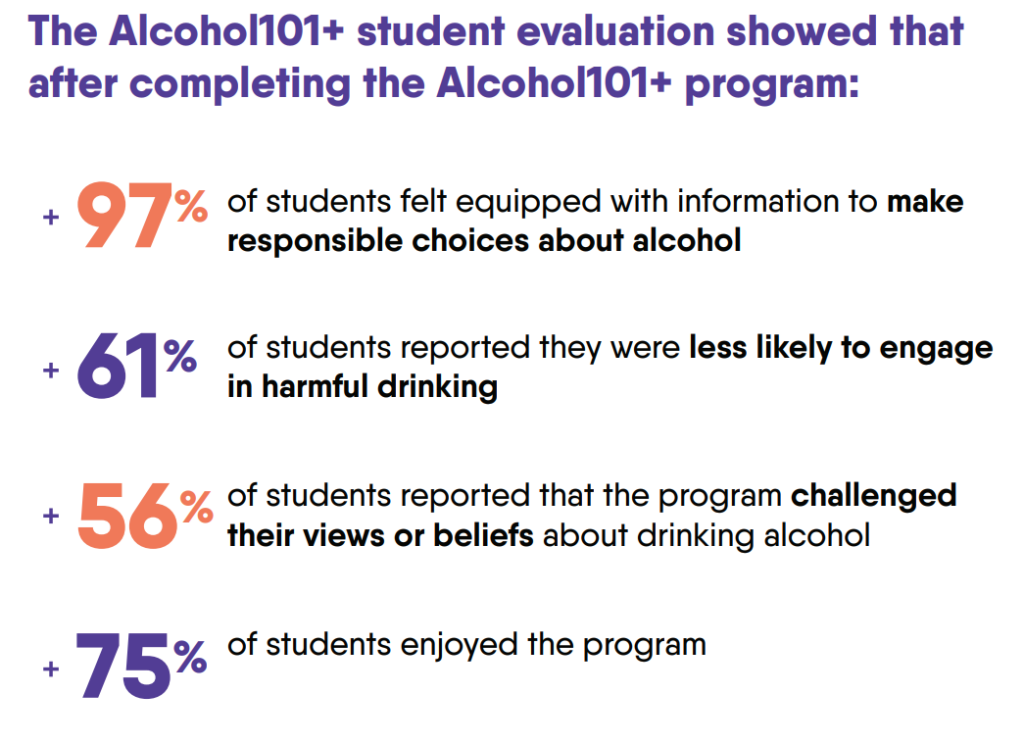
Drinking among college students has remained relatively unchanged over the past five years. In 2022, 63% of college students reported having consumed alcohol in the past 30-days, with slightly more than one in four (28 percent) reporting they engaged in binge drinking. One in twenty college students report high-intensity drinking (having 10 or more drinks in a row), with male students two times more likely than their female peers to engage in this risky behavior.
Prevention Resources for Universities
Alcohol101+ is a cost-free digital alcohol education program for colleges, universities, and organizations to use with college age students. Alcohol101+ is designed to provide college students with the knowledge and skills needed to make responsible decisions around alcohol, including not drinking. Within that broad goal, the program aims to:
- Increase student awareness of the potential hazards of binge drinking.
- Increase student intention to change drinking behaviors.
- Contribute to behavior change by decreasing binge drinking.
- Increase empathy and understanding that personal drinking choices impact others.
Throughout this self-guided program, students learn about core alcohol education topics and apply that knowledge using a series of interactive simulations and activities. Upon completion, students receive individualized feedback and recommendations based on their experiences and perceptions of alcohol.
“This one was more engaging than other programs. That’s the best part about it. It’s not just answering questions, it actually interacts with you.”
– Male Student, Age 19, Class of 2024
The program provides administrators a cost-free tool to incorporate into their comprehensive alcohol misuse prevention efforts. Administrators have access to a personalized dashboard that can be used to roster students, track progress, set due dates, and send reminders. The Alcohol101+ dashboard gives administrators real-time metrics and analytics that provide insights into students’ experiences with alcohol, trends, attitudes, and intentions. More information for administrators can be found in the Alcohol101+ Administrator’s Guide.
Since it launched, the program has been used with students at over 150 colleges, universities, and organizations for a variety of purposes including new student orientations, in response to alcohol-related student conduct violations, with fraternity and sorority chapters, and for general health promotion.
Organizations interested in learning more about the program or registering can visit www.Alcohol101.plus.
Program Evaluation Studies
Several independent evaluation studies of Alcohol101+ have been completed to assess the effectiveness and impact of Alcohol101+ among today’s college students. The evaluations demonstrated that Alcohol101+ fills an important and vital gap in knowledge and preparation of students for a responsible and safe college experience.
Students reported obtaining new knowledge on topics such as:
• Standard drink size and contents
• Effects of alcohol on the body
• Negative consequences of drinking alcohol
• Safety and risk reduction strategies and
• Protective factors

“The program appears to make a difference with students, and it also provides rich data that can aid campus administrators as they develop needs-based and locally-appropriate strategies and educational approaches for their campuses. As a no-cost, easily accessible, and impactful resource, Alcohol101+ adds significant value to campus strategies addressing alcohol issues.”
– David Anderson, Ph.D. and Tom Hall, Ph.D., program evaluators
Program Development
Launched by Responsibility.org in fall 2021, Alcohol101+ is an updated version of the award-winning and independently evaluated Alcohol 101 and Alcohol 101 Plus programs which were used by colleges and universities in the late 1990s and early 2000s. The new Alcohol101+ was developed under the advisement of a group of experts in the field of prevention on college campuses. Today’s program built on the foundations of previous versions, is based in the constructs of the Transtheoretical Model of behavior change, or the Stages of Change model, which posits that people reside in different stages when it comes to modifying their behavior and should be provided with programming that is personalized to their specific stage of change. While including updated content that is highly interactive and quick-paced, throughout Alcohol101+, students receive individualized feedback and resources tailored to their own experiences with and perceptions of alcohol.
For those students under the age of 21, the program reinforces that consuming alcohol is both illegal and harmful to their development.
“I think that the language, graphics, and presentation of the scenarios do allow for people my age to learn about alcohol consumption and safety through a more interactive and memorable form than other traditional alcohol safety programs.”
– Female Student, Age 19, Class of 2024
Alcohol101+ was developed under the advisement of a group of experts in the field of prevention on college campuses. This working group consisted of the following individuals:
- David S. Anderson, Ph.D., Professor Emeritus of Education and Human Development, George Mason University
- Susie Bruce, M.Ed., Director, The Gordie Center at the University of Virginia
- Robert J. Chapman, Ph.D., Associate Clinical Professor of Behavioral Health Counseling (retired), Drexel University
- Ashley Hinton-Moncer, M.S., M.P.H., Former Director of Student Wellness, University of Kentucky
- Aimee Hourigan, Director of Substance Abuse Prevention and Education, University of South Carolina